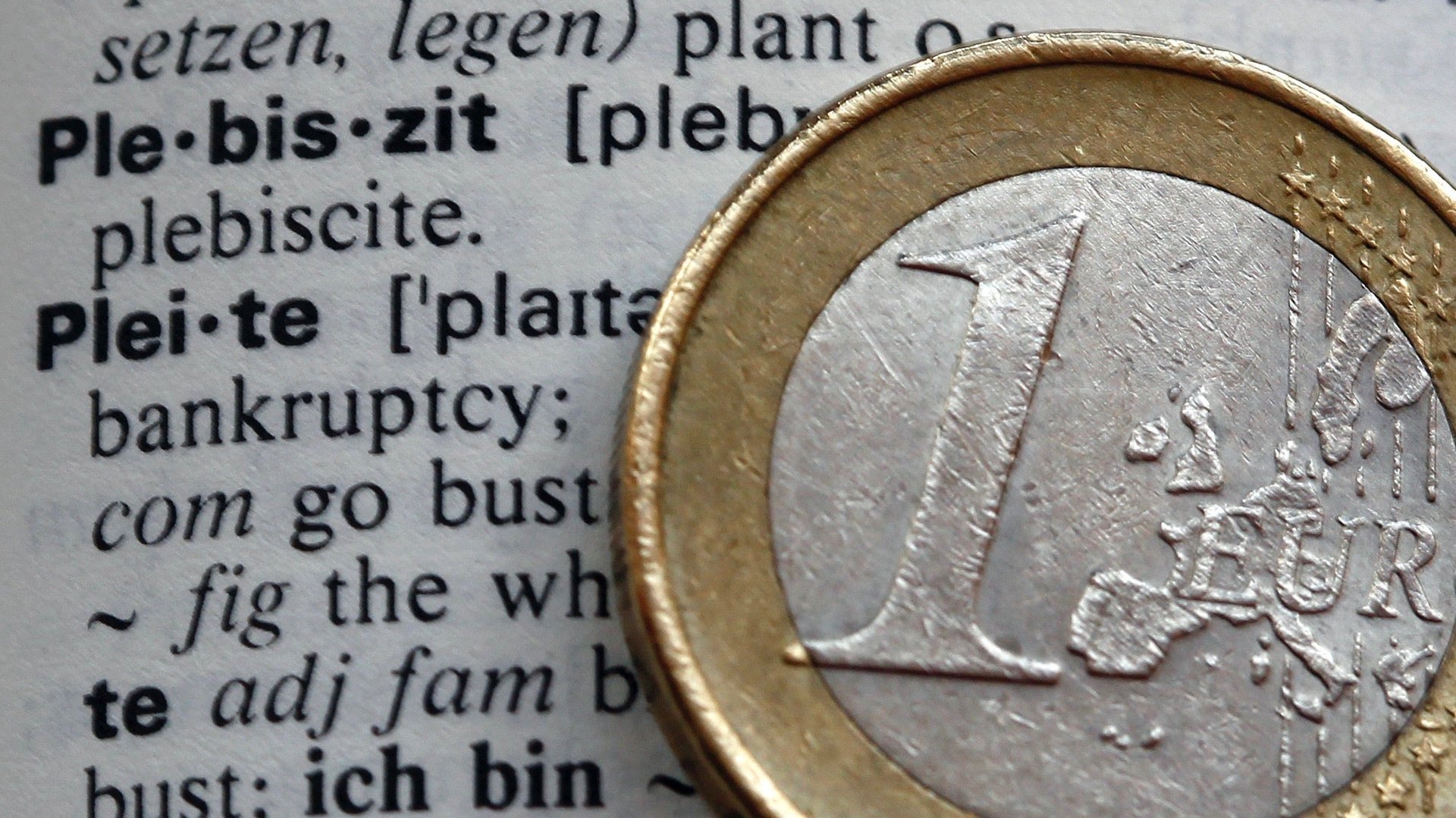Seven German words that English-speakers need to make sense of 2016 and prepare for 2017
English is rich with linguistic treasures. But it’s missing certain words for sentiments that the events this year generated. While every year has ups and downs, this one was uniquely tiresome from the start.


English is rich with linguistic treasures. But it’s missing certain words for sentiments that the events this year generated. While every year has ups and downs, this one was uniquely tiresome from the start.
Luckily, German is particularly adept at describing complex emotions in a single word, providing added nuance, description, or color, that this tongue sometimes lacks. Whether you felt blah, bad, sad, mad, melancholy, or philosophical, there’s a little extra something in the German versions of these words that make them perfect—le bon mot, as the French say—to describe these times.
Blaumachen:
The mosquito-borne Zika virus reached epidemic proportions in January and February. Public health experts worldwide warned against traveling to, or attempting to conceive in, affected areas. All of humanity, it seemed, would be destroyed by tiny mosquitoes carrying disease. It was enough to inspire, well…not much, but certainly blaumachen.
Literally, blaumachen means blue-making. It’s used in German to indicate a day off prompted by lack of motivation—basically, playing hooky. The word originates from the term Blauer Montag, or Blue Monday, which refers to the day of rest for fabric crafters in the Middle Ages, who soaked cloth in indigo on Sunday and dried them the next day, allowing the workers to take time off.
Todtraurig
March came in like a lion and didn’t leave like the proverbial lamb, alas. It was no better than the year’s start; in fact it was dead sad, or todtraurig.
This time, humans were to blame for the extreme grief. On March 22, three coordinated terrorist bombings in train stations in Brussels, Belgium, killed over 30 people and injured at least 250. Days later, a terrorist bombing in a park in Lahore, Pakistan killed 75 people and injured about 340.
Schockstarre
Sadness turned into something more than shock—more like stunning, paralyzing surprise, or schockstarre—when Brits approved a referendum to exit the European Union. Brexit, it turned out, was only signaling more shocks to come.
Fuchsteufelswild
In July, we were stunned out of paralysis into dismay by displays of fuchsteufelswild. The word describes behavior that’s as wild as that of a fox, and mad as that of the devil, and there was plenty of that going around.
On July 5, police in Louisiana shot Alton Sterling point blank in a parking lot; the killing was caught on camera by onlookers. The next day, Philando Castile was shot and killed by Minnesota police officer Jeronimo Yanez during a routine traffic stop in Minnesota. Castile’s fiancé, Diamond Reynolds, who was in the car with her 4-year-old daughter, live-streamed the aftermath on Facebook, setting off a national fury. In response to the police brutality, at a Black Lives Matter protest in Texas on July 7, Micah Xavier Johnson shot and killed five police officers, injuring seven, along with two civilians. He was then killed by a robot-delivered bomb, and more madness soon followed.
Backpfeifengesicht
It’s probably safe to say that members of Hillary Clinton’s not-so-secret club of Facebook admirers, Pantsuit Nation, think Donald Trump has a face that begs to be slapped. The Germans have a word for that, backpfeifengesicht.
But it was Democrats who felt the sting of Trump’s win on November 7, when he was elected president. This only stirred up more complex emotions.
Weltschmerz
By the end of the year, it’s hard not to feel melancholy about life and death and the world itself. That’s true for any year.
But the weltschmerz—literally world pain—feels particularly acute with all the drama that has ensued, and in a year marked by the deaths of the weird musical geniuses David Bowie and Prince. Then, to add insult to injury, Leonard Cohen bowed out on Nov. 9, leaving us with no master of the sad song in a time when poetry was perhaps the only proper language to describe our angst.
Sehnsucht
After all the disease, death, and drama, there is life longing, a craving for another way, or sehnsucht.
In that spirit, France’s President just announced he will not run for re-election after a disastrous and difficult term. He is ceding power to pursue other paths and because he’s extremely unpopular. Meanwhile, Angola’s president of 37 years, Jose Eduardo dos Santos, announced he is stepping down. In Austria, far-right candidate Norbert Hofer conceded defeat in Austria’s presidential race on Dec. 4. Italy’s prime minister, Matteo Renzi, and New Zealand’s prime minister, John Keys, also stepped down, clearing the way for a different path.
Sure, English has the words “desire” and “yearning”, but sehnsucht, with its soft sounds and soothing alliteration, feels special, as if signalling that the alternatives sought are possible.
Frühschoppen
The beauty of humans is our indomitable spirit. Despite the disasters and discouragements, we continue to have fun, pretty determinedly on some occasions.
Every day presents a new opportunity to enjoy, not least January 1. Indulge in a little early-morning drinking, or frühschoppen, before starting anew.
Waldeinsamkeit
Before you begin it all again, connect with the origins. Literally, waldeinsamkeit means forest solitude. But what the word describes is being one with nature.
Artists, sages, writers, and scientists, all extol the virtues of a walk in the woods. It will do the body, mind, and spirit good to forest bathe the old year away…ahead of more complicated events and emotions.